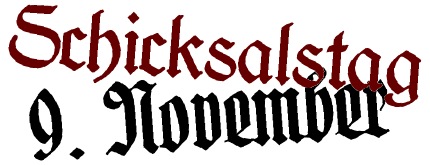London, GB | Formerly of New York, Buenos Aires, Fife, and the Western Cape. | Saoránach d’Éirinn.

About Andrew Cusack
 Writer, web designer, etc.; born in New York; educated in Argentina, Scotland, and South Africa; now based in London.
Writer, web designer, etc.; born in New York; educated in Argentina, Scotland, and South Africa; now based in London. read more
News
Blogs
Reviews & Periodicals
Arts & Design
World
France
Mitteleuropa
Knickerbockers
Argentina
The Levant
Africa
Cape of Good Hope
Netherlands
Scandinavia
Québec
India
Muscovy
Germany
Academica
The ‘Day of Fate’

THE NINTH OF November is sometimes known in Germany as ‘Schicksalstag’ or the ‘Day of Fate’ owing to the series of events significant to modern German history which took place on the day in 1848, 1918, 1923, 1938, and 1989.
1848: Liberal revolutionary Robert Blum is executed for his part in the rebellions of that year.
1918: Kaiser Wilhelm II is dethroned in the November Revolution, marking the end of the German monarchy.
1923: Hitler attempts his failed ‘Beer Hall Putsch’ which signficantly raises the profile of his tiny National Socialist German Workers’ Party.
1938: Synagogues and private property belonging to Jews are violently attacked in the ‘Kristallnacht’ pogrom.
1989: The politburo of Communist East Germany decides to relax the border-crossing restrictions between East and West Germany, leading to the fall of the Berlin Wall.
1918: Kaiser Wilhelm II is dethroned in the November Revolution, marking the end of the German monarchy.
1923: Hitler attempts his failed ‘Beer Hall Putsch’ which signficantly raises the profile of his tiny National Socialist German Workers’ Party.
1938: Synagogues and private property belonging to Jews are violently attacked in the ‘Kristallnacht’ pogrom.
1989: The politburo of Communist East Germany decides to relax the border-crossing restrictions between East and West Germany, leading to the fall of the Berlin Wall.
The first and last events (1848 and 1989) were encouraging events, while the three in between (1918, 1923, and 1938) were progressively worse. Indeed, it could easily be said that 1938 could not have happened without 1923, and that 1923 could not have happened without 1918, so these occurrences are not unrelated.
Leave a comment
Search
Instagram: @andcusack
Click here for my Instagram photos.Most Recent Posts
- Letters Patent May 8, 2024
- Bicycle Rack April 29, 2024
- Burns Tower April 19, 2024
- Patrick in Parliament March 18, 2024
- Articles of Note: 13 March 2024 March 13, 2024
Most Recent Comments
Book Wishlist
Monthly Archives
Categories
Home | About | Contact | Paginated Index | Twitter | Facebook | RSS/Atom Feed
andrewcusack.com | © Andrew Cusack 2004-present (Unless otherwise stated)


